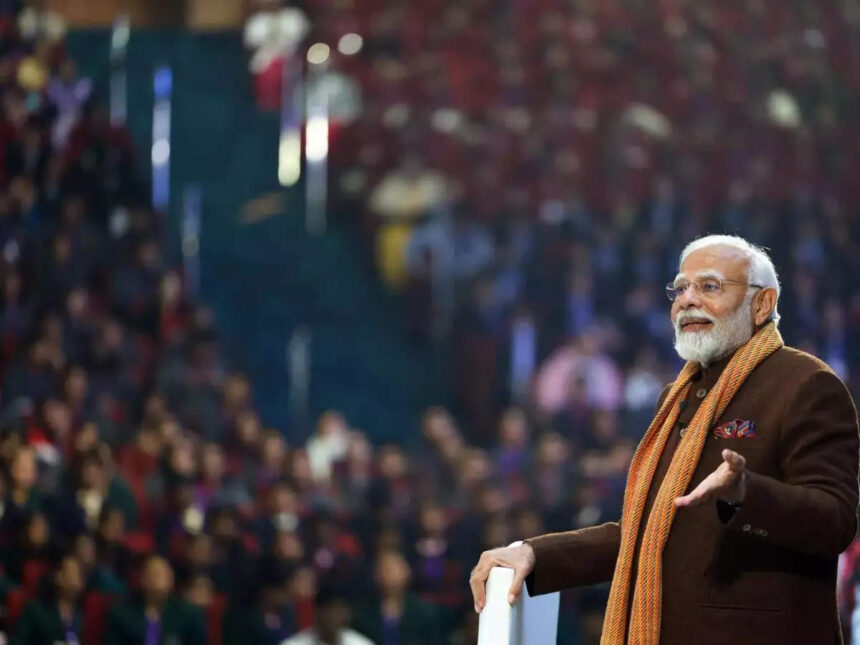Modi’s Historic Visit to Austria: First Indian PM in 41 Years to Strengthen Bilateral Ties and Economic Cooperation
In a landmark moment for India-Austria relations, Prime Minister Narendra Modi’s visit to Austria marks the first time an Indian Prime Minister has visited the country in 41 years, following in the footsteps of Indira Gandhi’s visit in 1983. This significant event underscores the deepening ties between the two nations and sets the stage for a new era of cooperation and mutual growth. This article delves into the reasons behind Modi’s visit, its historical context, and the implications for future bilateral relations.
Historical Context
Indira Gandhi’s visit to Austria in 1983 was a pivotal moment in the history of India-Austria relations. During her tenure, Gandhi aimed to strengthen India’s diplomatic outreach and foster stronger ties with European nations. Her visit to Austria was part of this broader strategy, focusing on enhancing economic cooperation, cultural exchange, and political dialogue. Despite the promising discussions and agreements, subsequent years saw limited high-level exchanges, and it wasn’t until four decades later that another Indian Prime Minister would visit Austria.
Also Read: Labour Party Wins UK Election in a Landslide: A New Political Era
Why Modi’s Visit Happened
Prime Minister Narendra Modi’s visit to Austria in 2024 is driven by several strategic, economic, and geopolitical factors:
- Strengthening Bilateral Relations:
- Modi’s visit aims to rejuvenate and expand the bilateral relationship between India and Austria. Both nations have recognized the potential for collaboration in various sectors and see this visit as an opportunity to chart a new course for mutual benefit.
- Economic Cooperation:
- Austria and India have substantial opportunities for economic cooperation. Austria’s advanced technological expertise, particularly in areas such as renewable energy, infrastructure, and manufacturing, aligns well with India’s growth ambitions. Modi’s visit aims to attract Austrian investments and technology transfers to bolster India’s industrial and economic landscape.
- Geopolitical Considerations:
- In an increasingly multipolar world, India seeks to strengthen its ties with European nations. Austria, located in the heart of Europe, is a strategic partner that can help India navigate its interests within the European Union. This visit underscores India’s intent to bolster its presence and influence in Europe.
- Cultural and Academic Exchange:
- Enhancing cultural and academic exchanges is another significant aspect of Modi’s visit. By promoting people-to-people connections, the visit aims to foster greater understanding and collaboration in education, research, and cultural heritage.
- Strategic Partnerships:
- Modi’s visit also focuses on establishing strategic partnerships in sectors such as defense, cybersecurity, and space technology. Austria’s expertise in these areas can contribute to India’s strategic objectives, ensuring both nations benefit from shared knowledge and resources.
Key Highlights of Modi’s Visit
Prime Minister Modi’s itinerary in Austria includes several high-profile meetings, cultural events, and bilateral discussions. Here are some key highlights:
- Bilateral Talks with Austrian Leadership:
- Modi will hold extensive talks with Austrian Chancellor Karl Nehammer. These discussions are expected to cover a wide range of topics, including trade, investment, technology, climate change, and global security. Both leaders will seek to identify areas of common interest and develop a roadmap for future cooperation.
- Economic and Trade Agreements:
- The visit is anticipated to result in the signing of several economic and trade agreements. These agreements will focus on enhancing trade relations, promoting investment in key sectors, and facilitating technology transfer. Key sectors of focus include renewable energy, information technology, pharmaceuticals, and engineering.
- Cultural Diplomacy:
- Modi’s visit will also emphasize cultural diplomacy. He is scheduled to inaugurate an exhibition showcasing Indian art and culture, aimed at strengthening cultural ties and promoting India’s rich heritage in Austria. Additionally, there will be academic collaborations announced between leading universities from both countries.
- Engagement with the Indian Diaspora:
- Austria is home to a vibrant Indian diaspora, and Modi’s visit includes a significant engagement with the Indian community. This interaction is expected to focus on discussing the contributions of the Indian diaspora to Austria’s development and exploring ways to strengthen their connection with India.
- Strategic Partnerships:
- Discussions on strategic partnerships in defense, cybersecurity, and space technology will be a crucial aspect of Modi’s visit. Given Austria’s technological advancements, these collaborations can provide India with critical capabilities and foster mutual growth in strategic sectors.
The Significance of Modi’s Visit
Modi’s visit to Austria holds considerable significance for several reasons:
- Reinvigorating Historical Ties:
- After a gap of 41 years, Modi’s visit symbolizes a renewed commitment to strengthening historical ties. It marks a fresh chapter in India-Austria relations, emphasizing the importance of sustained high-level engagement.
- Economic Opportunities:
- The visit highlights the economic opportunities available for both nations. By focusing on trade, investment, and technology transfer, Modi’s visit aims to create a robust framework for economic collaboration that can drive growth and development.
- Strategic Collaborations:
- The discussions on strategic partnerships underscore the evolving nature of India-Austria relations. By exploring collaborations in defense, cybersecurity, and space technology, both nations can address shared security challenges and advance their strategic interests.
- Enhanced Cultural Exchange:
- Cultural diplomacy plays a pivotal role in fostering mutual understanding and goodwill. Modi’s emphasis on cultural and academic exchanges will contribute to a deeper appreciation of each other’s heritage and promote people-to-people connections.
- Geopolitical Impact:
- Modi’s visit to Austria also holds geopolitical significance. Strengthening ties with Austria enhances India’s influence in Europe and provides a strategic partner to navigate the complexities of global politics. It aligns with India’s broader strategy of engaging with European nations to advance its global interests.
Conclusion
Prime Minister Narendra Modi’s visit to Austria, the first by an Indian Prime Minister in 41 years, marks a historic and significant moment in India-Austria relations. By focusing on strengthening bilateral ties, enhancing economic cooperation, exploring strategic partnerships, and promoting cultural exchange, Modi’s visit sets the stage for a new era of collaboration and mutual growth. The visit not only reinvigorates historical ties but also underscores the evolving nature of India-Austria relations in an increasingly interconnected world. As both nations look forward to a future of shared prosperity and strategic alignment, Modi’s visit to Austria stands as a testament to the enduring and dynamic partnership between India and Austria.







